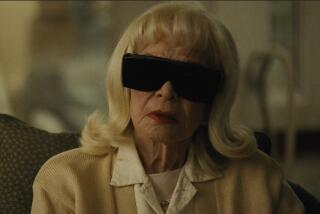Movie review: ‘Tiny Furniture’
There are tiny pleasures to be found in “Tiny Furniture,” a bare mumble of mumblecore musings on a brief time in the life of a young woman named Aura. She’s a lot like the film’s writer-director Lena Dunham, and in fact is portrayed by Dunham herself.
The film is set in that dark place that so often falls between finishing college and figuring out the rest of your life, with the penance for your indecision a move back in with your parents. It begins with that homecoming, Aura unpacking her unhappiness along with her bags.
With “Tiny Furniture,” Dunham — who wrote and shot the film a year after graduating from Oberlin College in 2008 — solidifies herself as one of the promising new voices in the independent film world. Not nearly as raw around the edges as her first feature shot mostly in her Oberlin dorm, “Tiny Furniture” proves Dunham to be increasingly insightful about her own free-floating world.
Aura’s mother, Siri, is played by Dunham’s mother, Laurie Simmons. Both are artists, with Siri’s work not unlike Simmons’ acclaimed surreal photographs of scenes created using dolls and mannequins. In the film, Siri is busy shooting rooms of tiny furniture. Meanwhile, Aura’s younger, far-slimmer sister, a high school senior named Nadine, is portrayed by Dunham’s younger sister Grace. The fictional sister, like the real one, is a noted young poet and primed for college success. We can guess that some of Aura’s insecurities — about her body, about her life — are extensions of the filmmaker too.
Much of the movie is set and shot in the family’s Tribeca loft, all of which puts “Tiny Furniture” on a continuous cycle of life imitating art imitating life among New York’s well-heeled intellectual set. With a stream-of-consciousness feel that only adds to the blurry line between fiction and reality, cinematographer Jody Lee Lipes follows along as Aura tries to get on with her life and manage the friction with the family.
More like a lot of loosely linked experiences than a tightly constructed story, the film follows Aura as she takes on a dead-end job as a hostess at a hip restaurant, develops a crush on the hunky chef ( David Call), falls into a codependent flirtation with a depressive filmmaker (Alex Karpovsky), and makes a problematic reconnection with the past via an old high-school chum, Charlotte (Jemima Kirke), one of the beautiful abandoned children of privilege with too much time and money on their hands. There will be some sex, much drinking and no epiphanies. That’s not to suggest there is no narrative arc, though any conclusions are muddy at best.
What the film does well is capture the confusion of the identity abyss of twentysomethings of a certain social class. And for all the narcissistic meandering, and there’s a good deal of that, Dunham has made the subtext intriguing, which is to say you will likely find yourself thinking more about the film than you expected. The art, for instance, that occupies her mother is surreal photographs of carefully staged rooms of tiny furniture — no accident that the shots are beautiful, but the rooms are empty, as if waiting for life to stop by. The desperate sex is really about human connection and made sadder for the lack of it.
That Aura drifts along like so much flotsam tossed about by friends and lovers would be more frustrating without Dunham’s presence. She’s turning out to be a soulful artist with a gift for intimacy both in front of and behind the camera. It makes you want to give her some room to develop, and leaves you wondering what it might look like if she ever takes on the world outside of herself.
More to Read
Only good movies
Get the Indie Focus newsletter, Mark Olsen's weekly guide to the world of cinema.
You may occasionally receive promotional content from the Los Angeles Times.











